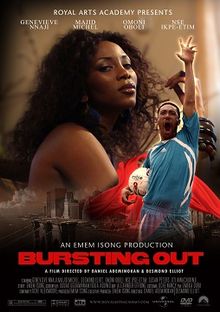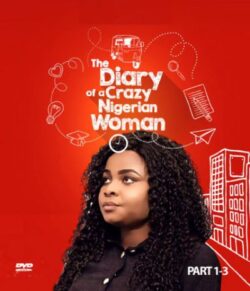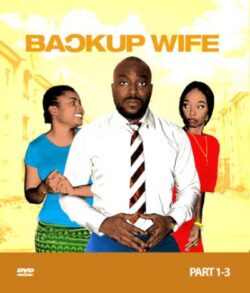
Starring: Yvonne Nelson, Belinda Effah, Okawa Shaznay, Sahndra Fon Dufe, David Chin
Synopsis:
Three women escape a life of poverty in Ghana by traveling to the US to chase their dreams but suffer many obstacles along the way.
Review:
A group of friends escaped their impoverished lives in the slums of Ghana. As stowaways on a ship they headed to the US with nothing but their dreams. Chaos ensued when they were discovered among the stored cargo and were either killed or raped.
Three of the women, Nkoyo, Nahlela, and Eurykan, survived the journey and set out to become recording artists. Luckily, the head of a record company was impressed with their Afro Vibe sound. They were asked to change their ethnic look and names but only one of them was willing to conform thus leading the group to head separate ways in the music business.
Nkoyo (Belinda Effah) adapted a new lifestyle that included drugs while Nahlela (Okawa Shaznay) became involved with her manager who had imperceptible mental issues that surfaced when he believed she was disloyal.
The subplot introduced Afua (Yvonne Nelson), a Ghanian woman that migrated to the US and became romantically involved with a biracial man. His white parents (mother & stepfather) shunned her because she was African and she was forced to reevaluate her relationship.
Let’s Talk. This movie had a mix of topics going on. It started with a group of young adults that set out to rewrite their destiny but they quickly learned the pitfalls of the music industry and the misconceptions about life in America. The story delved into racism, culture clash, and it briefly tackled mental illness.
Obviously the filmmakers had a lot to say and seemed to want to expose the behind the scenes happenings of the music business. It was reminiscent of the Hollywood movie “Dreamgirls” but nowhere as good. The second storyline that featured the interracial couple was also refried drama.
Parents, as seen in movies, normally disapprove of their children’s spouse due to social status, religion, or as in this case, race. What’s interesting here was that a white woman had a son for a Black man but her biracial son, the fruit of the affair, wasn’t allowed to love a Black woman. Hmm… The story dictated that she resented her Black lover for abandoning her so apparently she spewed resentment on the entire African country. Racism at its finest.
The movie was unintentionally preachy as characters recited lines like “ no human race is superior to the other.” I agree with the statement however there’s a thin line between pride in one’s country and superiority. My opinion is that the world will never be free of racism. It’s something that’s taught and it passes on from generation to generation. How do you control that?
I’m not one to make racism my issue though. Any negativity that my brown skin stirs in others is their problem. I just carry on with my day. I’m a child of God first, and then a Black woman. And with that I rise.
The one scene that really irked me was the club scene where Yvonne Nelson’s character, Afua, was slapped by her boyfriend’s ex-girlfriend.
First the filmmakers allowed African women to be raped at gunpoint on a ship and then an African woman is slapped? Where was the respect for African women? Where was the justice?
There wasn’t a scene where the rapists were punished and the Afua character wasn’t written with the conviction to slap that b*tch back. How much hardship and disrespect is the Black woman supposed to endure?
Another gaping hole in the story is when one of the characters was conveniently sent to prison. It was just too convenient and quite frankly, it was insulting to one’s intelligence.
On a positive note, the movie was shot in the US and Ghana and the casting was diverse. I love to see these collaborations but somehow these movies are rarely good thanks to shoddy screenplays and/or mediocre acting.
Performances? Most were satisfactory. You can always bank on Yvonne Nelson and Belinda Effah. David Chin played “Gibson” and I thought he had a striking resemblance to Majid. He did a respectable job as well.
Video, sound, and camera direction sufficed and music was well placed. Some of the actors were not credited. This is where an efficient producer was needed. All actors should be acknowledged for their work.
As mentioned in a prior post, Director, Frank Rajah Arase has delivered some entertaining movies and he has contributed a lot to the industry. I normally look forward to watching his movies but for this one I wasn’t particularly absorbed.
It started off on fire but somehow digressed into typical melodramatics. Some of the dialogue was actually relevant but as noted above, there were bothersome story issues – enough to conclude that I won’t be watching this movie ever again. EJECT
- Rated: Not Listed
- Genre: Drama
- Release Date: 2016
- Directed by: Frank Rajah Arase
- Starring: Yvonne Nelson, Ramsey Nouah, Okawa Shaznay, Bismark Nii Odoi, Belinda Effah, Diana Yekini, Sira Bah Adama, Sahndra Fon Dufe, Ross Fleming, David Chin, Glenn Turner, Anastasia Perkhtereva
- Written by: Frank Rajah Arase, Dianne Diaz
- Studio: Heroes Productions, Raj Films
- Country: Ghana, USA






like it
I guess you’re saying you liked the movie. We all have a right to our opinions, and there were some things to like about it the movie, but to me, not enough.